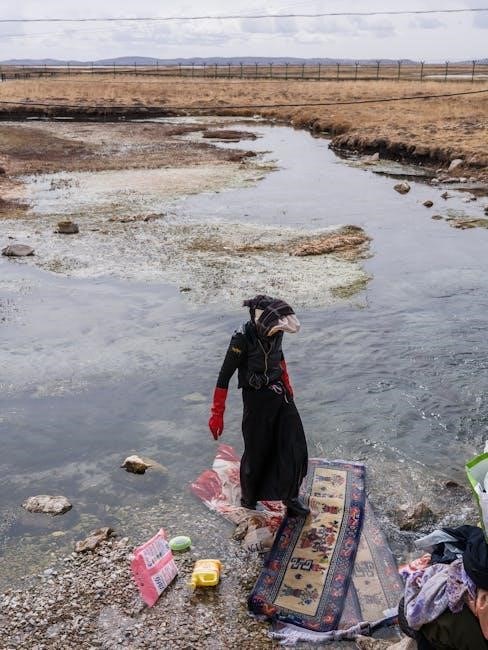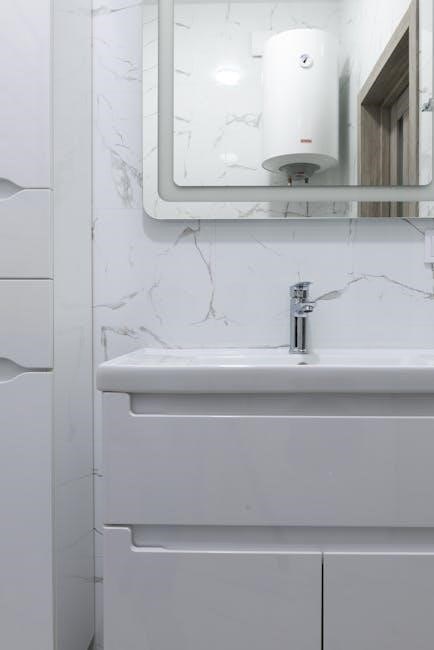Bosch tankless water heaters offer innovative‚ energy-efficient solutions for hot water needs. Designed for space-saving installation‚ they provide continuous hot water with advanced technology and reliability.
1.1 Overview of Bosch Tankless Water Heater Models
Bosch offers a wide range of tankless water heater models designed to meet various residential and commercial needs. These include the Greentherm series‚ known for high efficiency‚ and the Tronic series‚ which provides reliable performance. Gas-powered models like the Greentherm T9900 SE and electric models like the Tronic 6100 C are available‚ catering to different fuel preferences. Each model is engineered to deliver continuous hot water while minimizing energy consumption. Whether for indoor or outdoor installation‚ Bosch tankless water heaters are designed to be compact‚ durable‚ and environmentally friendly‚ ensuring long-term efficiency and reliability for users.
1.2 Benefits of Using Bosch Tankless Water Heaters
Bosch tankless water heaters provide numerous advantages‚ including significant space savings due to their compact design. They offer continuous hot water supply‚ eliminating the need for a storage tank. With high energy efficiency ratings‚ these heaters reduce energy consumption and lower utility bills. Additionally‚ they have a longer lifespan compared to traditional water heaters‚ lasting up to 20 years or more. Bosch models also feature advanced safety mechanisms and are designed to be environmentally friendly‚ reducing emissions. Their versatility allows installation in various settings‚ making them a practical choice for both residential and commercial applications. Overall‚ Bosch tankless water heaters deliver reliability‚ efficiency‚ and durability for modern water heating needs.

Installation Instructions
Installation of Bosch tankless water heaters requires a licensed professional to ensure safety and efficiency. Follow manufacturer instructions for venting‚ wiring‚ and gas connections to meet local codes.
2.1 Pre-Installation Requirements
Before installing a Bosch tankless water heater‚ ensure the site meets specific requirements. The area must be well-ventilated‚ and the unit must be installed by a licensed professional. Check local building codes and regulations to ensure compliance. Verify the water heater’s compatibility with your home’s electrical and gas systems. Ensure proper venting materials are available‚ as specified in the manual. The heater must be installed on a firm‚ level surface to prevent damage. Additionally‚ ensure the necessary water and gas lines are correctly sized and configured. Failure to meet these requirements can result in safety hazards or reduced efficiency.
2.2 Step-by-Step Installation Guide
Install the Bosch tankless water heater by following these steps: First‚ mount the unit on a level surface using the provided brackets. Next‚ connect the water inlet and outlet pipes according to the manual’s piping diagram. Ensure all connections are secure to prevent leaks. Then‚ install the ventilation system as specified‚ ensuring proper airflow. Connect the gas line if applicable‚ and test for leaks using a soap solution. Finally‚ connect the electrical supply and program the control panel. Always follow the manufacturer’s instructions and local codes. If unsure‚ consult a licensed professional to ensure a safe and correct installation.
2.3 Post-Installation Checks and Tests
After installation‚ perform a series of checks to ensure the Bosch tankless water heater operates safely and efficiently. Begin by verifying that all connections‚ including water‚ gas‚ and electrical lines‚ are secure and leak-free. Turn on the water supply and check for any visible leaks at the connections. Next‚ test the ignition system by running a hot water tap to ensure the unit ignites properly and produces hot water. Check the temperature setting to confirm it matches the desired output. Finally‚ review the control panel for any error codes and ensure all safety features‚ such as the overheat protection‚ are functioning correctly. If any issues arise‚ refer to the troubleshooting guide or contact a licensed professional for assistance.

Operating Instructions
Bosch tankless water heaters require proper operation to ensure efficiency. Follow the manual for start-up‚ temperature adjustment‚ and control panel usage to optimize performance and safety.
3.1 Initial Start-Up Procedure
Before starting your Bosch tankless water heater‚ ensure all connections are secure and the power supply is on. Turn the gas valve to the “ON” position and press the ignition button. Allow the system to initialize. Check for any error codes on the control panel. Once the heater is operational‚ test the water temperature by running a faucet. Ensure the temperature setting matches your preference. Refer to the manual for specific instructions on initial start-up. Always follow safety guidelines to avoid accidents. After starting‚ monitor the system for proper function and schedule an annual inspection by a certified technician.
3.2 Adjusting Temperature Settings
To adjust the temperature on your Bosch tankless water heater‚ start by locating the control panel on the front of the unit; Use the plus (+) and minus (-) buttons to increase or decrease the temperature. Ensure the display shows the current temperature‚ typically ranging from 100°F to 140°F. Set it to your preferred level‚ such as 120°F for general use. Check if the control panel is locked to prevent accidental changes; if locked‚ press and hold the appropriate button to unlock. After adjusting‚ run hot water from a faucet to test the temperature. For safety‚ avoid adjusting the temperature while others are using hot water; Consult the manual for optimal settings and energy efficiency recommendations. If an error code appears‚ refer to the troubleshooting section.
3.3 Understanding the Control Panel
The control panel on your Bosch tankless water heater is designed for easy operation and monitoring. It typically features a digital display showing the current temperature and system status. Use the intuitive buttons to adjust settings‚ such as temperature or operation mode. LED indicators provide feedback on the unit’s operational state‚ such as active heating or error codes. A lock button may be present to prevent unintended changes. Familiarize yourself with the panel’s layout and functions to optimize performance and energy efficiency. Always refer to the manual for detailed instructions on using advanced features or troubleshooting. Proper use of the control panel ensures safe and efficient operation of your Bosch tankless water heater.

Maintenance and Troubleshooting
Regular maintenance ensures optimal performance of your Bosch tankless water heater. Inspect filters‚ check for leaks‚ and ensure proper ventilation. Troubleshoot common issues like error codes or low water flow by checking the user manual or contacting a professional for assistance.
4.1 Routine Maintenance Tasks
Regular maintenance is crucial to ensure the longevity and efficiency of your Bosch tankless water heater. Start by inspecting and cleaning the air intake and venting systems to ensure proper airflow. Check for any blockages or debris that might affect performance. Next‚ examine the water filters and replace them as recommended to prevent mineral buildup and maintain water quality. Additionally‚ annually drain the heater to remove any sediment accumulation‚ which can reduce efficiency and cause damage over time. Always refer to your user manual for specific instructions tailored to your model. Routine checks help prevent common issues and keep your unit running smoothly.
4.2 Common Issues and Solutions
Common issues with Bosch tankless water heaters include error codes‚ insufficient hot water‚ and ignition failures. If an error code appears‚ refer to the manual to diagnose the issue. For insufficient hot water‚ check water flow rates and temperature settings. Ignition failures may result from faulty electrodes or gas supply issues. Additionally‚ mineral buildup can reduce efficiency‚ requiring descaling as outlined in the manual. Regular maintenance‚ such as filter cleaning and vent inspection‚ can prevent many of these issues. If problems persist‚ consult a licensed professional to ensure safety and proper repairs. Addressing these issues promptly ensures optimal performance and extends the heater’s lifespan.
4.3 When to Call a Professional
If you encounter complex issues with your Bosch tankless water heater‚ such as persistent error codes‚ gas leaks‚ or system malfunctions‚ contact a certified technician. Professional assistance is recommended for tasks like annual inspections‚ descaling‚ and internal repairs. Ensure the technician is licensed and experienced with Bosch models to guarantee compliance with safety standards and manufacturer guidelines. Regular professional maintenance can prevent major issues‚ enhance efficiency‚ and prolong the heater’s lifespan. Always prioritize safety and adhere to the manual’s instructions regarding when professional intervention is required.

Safety Precautions
Always follow safety guidelines when operating Bosch tankless water heaters. Ensure proper installation‚ shut off power and gas before maintenance‚ and schedule annual professional inspections for optimal safety.
5.1 General Safety Guidelines
Always follow general safety guidelines when operating a Bosch tankless water heater. Ensure proper installation by a licensed professional to avoid hazards. Shut off power and gas supply before performing any maintenance. Regularly inspect the unit and venting system for damage or blockages. Keep the area around the heater clear of flammable materials. Never tamper with internal components or bypass safety features. Set temperature controls within safe limits to prevent scalding. Adhere to local building codes and manufacturer instructions for safe operation. Schedule annual professional inspections to ensure optimal performance and safety. Failure to comply may result in severe injury or property damage.
5.2 Emergency Shutdown Procedures
In case of an emergency‚ immediately shut off the gas supply and electrical power to the Bosch tankless water heater. Locate the manual gas valve and turn it to the “off” position. For electric models‚ isolate the electrical power supply at the circuit breaker or disconnect switch. Ensure the water heater is disconnected from the system to prevent further operation. If a gas leak is suspected‚ open windows for ventilation and avoid sparks. Do not attempt to restart the unit until a qualified technician has inspected and approved it for safe operation. Always prioritize safety and follow manufacturer guidelines to prevent accidents or damage.

Technical Specifications
Bosch tankless water heaters feature advanced models like Greentherm and Tronic‚ offering natural gas and LP gas compatibility‚ high energy efficiency‚ and Energy Star certification.
6.1 Key Features of Different Models
Bosch offers a range of tankless water heater models‚ each designed for specific needs. The Greentherm series features high-efficiency condensing technology‚ while the Tronic series provides electric tankless solutions with compact designs. The AquaStar models are known for their high flow rates‚ making them ideal for large households or commercial use. All models are equipped with advanced controls for precise temperature adjustment. Natural gas and propane options are available‚ alongside electric variants for flexibility. Energy Star certification ensures energy efficiency‚ while built-in safety features like overheating protection enhance reliability. These models cater to varying demands‚ ensuring consistent hot water delivery with minimal energy consumption and space requirements.
6.2 Compatibility with Various Fuel Types
Bosch tankless water heaters are compatible with multiple fuel types‚ offering flexibility for different setups. Natural gas models‚ such as the Greentherm series‚ provide high efficiency and reliability. Propane-compatible units are also available‚ ensuring operation in areas without natural gas access. Additionally‚ electric tankless water heaters‚ like the Tronic series‚ eliminate the need for fuel lines entirely. Dual-fuel models further expand versatility‚ allowing seamless integration with existing systems. This wide range of fuel compatibility makes Bosch heaters suitable for various residential and commercial applications‚ ensuring consistent performance regardless of fuel source. Proper installation by certified professionals is essential to maximize efficiency and safety.
6.3 Energy Efficiency Ratings
Bosch tankless water heaters boast impressive energy efficiency ratings‚ contributing to lower utility bills and environmental impact. The Greentherm series‚ for instance‚ features high Energy Factor (EF) ratings‚ exceeding federal standards. These units are ENERGY STAR® certified‚ ensuring energy efficiency and eligibility for rebates. Bosch electric models‚ such as the Tronic series‚ also offer high efficiency with reduced energy consumption. Advanced technologies like modulating burners and smart sensors optimize energy use‚ providing consistent performance while minimizing waste. These ratings highlight Bosch’s commitment to eco-friendly solutions‚ making their tankless water heaters a sustainable choice for modern homes and businesses. Proper installation and maintenance further enhance their efficiency‚ ensuring long-term energy savings.

Certifications and Compliance
Bosch tankless water heaters meet rigorous industry standards‚ earning certifications like ENERGY STAR® and compliance with ASHRAE and UPC regulations‚ ensuring safety and reliability.
7.1 Industry Certifications
Bosch tankless water heaters are certified by leading organizations such as ENERGY STAR®‚ ensuring they meet high standards for energy efficiency and environmental sustainability. Additionally‚ they comply with ASHRAE standards and UPC regulations‚ which cover safety and performance criteria for water heaters. These certifications not only validate the product’s quality but also ensure they meet or exceed industry requirements. Furthermore‚ Bosch models often carry the UL (Underwriters Laboratories) certification‚ which guarantees they meet rigorous safety standards. These certifications provide consumers with peace of mind‚ knowing their Bosch tankless water heater is reliable‚ efficient‚ and safe for residential and commercial use.
7.2 Compliance with Local Regulations
Bosch tankless water heaters are designed to meet local building codes and plumbing standards‚ ensuring safe and efficient installation in various regions. Compliance with regulations such as ASHRAE standards and UPC (Uniform Plumbing Code) is a priority‚ guaranteeing that the units operate within established safety and performance guidelines. Additionally‚ Bosch models are engineered to adhere to local emissions and energy efficiency requirements‚ making them suitable for both residential and commercial applications. Proper installation by licensed professionals is essential to ensure compliance‚ as outlined in the product manuals. Regular inspections by trained technicians further ensure ongoing adherence to local regulations‚ maintaining safety and optimal performance over time.

Common Applications
Bosch tankless water heaters are ideal for residential and commercial use‚ providing continuous hot water for bathing‚ laundry‚ and cooking. They are also suitable for radiant floor heating and integration with air handling systems‚ offering versatile solutions for modern water heating needs.
8.1 Residential Use
Bosch tankless water heaters are highly suitable for residential applications‚ offering space-saving and energy-efficient solutions for homes. They provide continuous hot water for multiple showers‚ sinks‚ and appliances simultaneously‚ making them ideal for families. Their compact design allows for wall-mounting‚ freeing up valuable floor space. Additionally‚ Bosch models like the Greentherm series are designed to meet the varying hot water demands of households while reducing energy consumption. They are also compatible with radiant floor heating systems‚ enhancing overall home comfort. With proper installation and maintenance‚ Bosch tankless water heaters deliver reliable performance and long-term durability for residential use.
8.2 Commercial Use
Bosch tankless water heaters are also ideal for commercial applications‚ delivering high-capacity hot water solutions for businesses. They are commonly used in restaurants‚ hotels‚ and office buildings where consistent hot water supply is crucial. Models like the Greentherm 9800 SE series are designed to handle heavy-duty demands with high efficiency. Their compact size allows for flexible installation in limited spaces‚ making them suitable for commercial settings. Bosch tankless heaters also reduce operational costs through energy efficiency and lower maintenance needs compared to traditional systems. Their reliability and durability ensure uninterrupted service‚ meeting the demanding requirements of commercial environments effectively.

Comparison with Traditional Water Heaters
Bosch tankless water heaters outperform traditional models by providing continuous hot water‚ reducing energy consumption‚ and saving space. They are more efficient and have a longer lifespan.
9.1 Space and Energy Efficiency
Bosch tankless water heaters are highly space-efficient due to their compact‚ wall-mountable design‚ freeing up valuable space compared to traditional tank heaters. They operate on-demand‚ heating water only when needed‚ which significantly reduces energy consumption and standby heat loss. This design ensures continuous hot water delivery while minimizing energy waste. Additionally‚ Bosch models often feature advanced technologies like electronic ignition and modulating burners‚ which optimize energy use and performance. With higher Energy Star ratings‚ these heaters provide long-term energy savings and environmental benefits‚ making them a superior choice for eco-conscious homeowners seeking efficient water heating solutions.
9.2 Cost Comparison
Bosch tankless water heaters typically have a higher initial purchase and installation cost compared to traditional tank-style heaters. However‚ their energy efficiency often leads to lower utility bills over time. While upfront expenses may be significant‚ especially for gas models requiring venting and gas line connections‚ the long-term savings in energy consumption can offset these costs. Electric models may have lower installation fees but could increase electricity usage. Additionally‚ tankless heaters generally have a longer lifespan and require less maintenance‚ further reducing long-term expenses. Overall‚ the higher initial investment is balanced by ongoing savings‚ making Bosch tankless water heaters a cost-effective option for many homeowners seeking efficient water heating solutions.

Environmental Benefits
Bosch tankless water heaters reduce energy consumption and emissions‚ conserving natural resources. Their efficient design minimizes environmental impact‚ making them a sustainable choice for eco-conscious homeowners.
10.1 Energy Savings
Bosch tankless water heaters provide significant energy savings by heating water only when needed‚ eliminating standby losses. This on-demand operation reduces energy waste‚ lowering utility bills and environmental impact. Unlike traditional tank heaters‚ Bosch models avoid continuously heating stored water‚ optimizing efficiency. With advanced technology‚ they deliver hot water instantly while maintaining high energy efficiency ratings. Proper installation and regular maintenance further enhance their energy-saving capabilities‚ ensuring long-term performance. By reducing energy consumption‚ Bosch tankless water heaters contribute to a more eco-friendly household‚ aligning with sustainable living goals;
10.2 Reduced Emissions
Bosch tankless water heaters are designed to minimize environmental impact by reducing emissions. Their high-efficiency burners and advanced combustion technology ensure lower greenhouse gas output. By operating only when hot water is needed‚ these heaters produce fewer emissions compared to traditional tank-style heaters‚ which constantly burn fuel to maintain water temperature. Additionally‚ Bosch models are compatible with cleaner fuel options like natural gas and propane‚ further reducing their carbon footprint. This eco-friendly design makes Bosch tankless water heaters a sustainable choice for homeowners seeking to lower their environmental impact while enjoying reliable hot water delivery.
